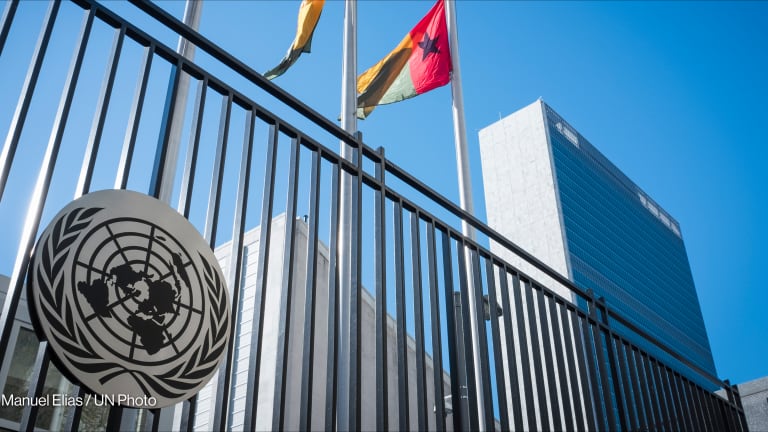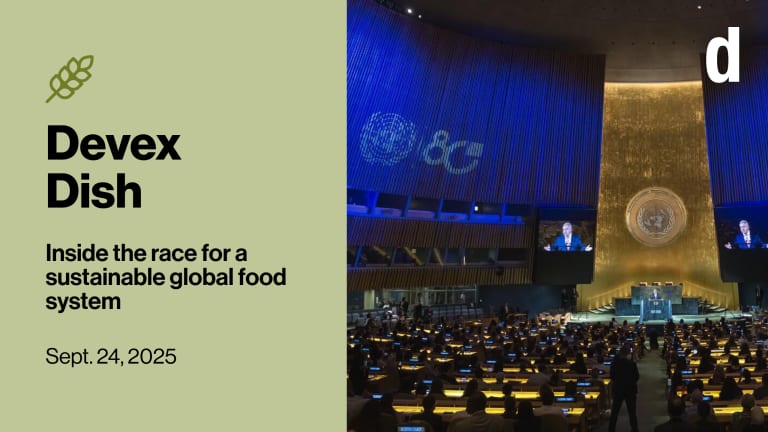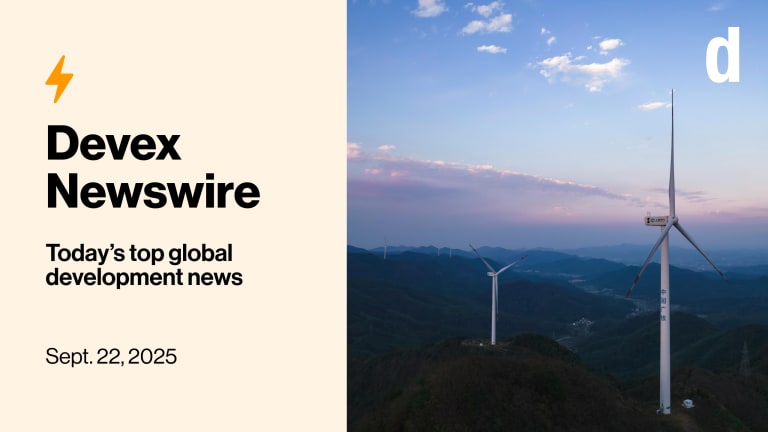
NEW YORK — President Donald Trump's twin appearances in New York this week — chairing a session on U.N. reform Monday and addressing the General Assembly Tuesday, plus whatever comments he might make on Twitter or to the press — could be the big story coming out of UNGA. But whatever he might say — and if history is a guide, there's every likelihood he'll be provocative and even divisive — I see a different narrative forming this week. It's the story of the global development community stepping up in a time of trouble.
Friday I went to see the new and outspoken U.N. Deputy Secretary-General Amina Mohammed, the Nigerian architect who engineered the Sustainable Development Goals. I asked her what this UNGA would be about.
She was characteristically blunt. “We are on a path to recalibrating our role in a very messed up world. That includes every single one of the members. Trump is a member of the U.N., and they must never forget that. Actions are about collective responsibility," she said.
For a decade, that collective responsibility was on display during UNGA across town at the Clinton Global Initiative, held for 11 years at a Sheraton just north of Times Square. Presidents and prime ministers would make the trek to a ballroom and enter a different world: tech leaders, activist celebrities, and social entrepreneurs — all optimists — crafting ideas for a better future. The circus master at these occasions was former President Bill Clinton himself. I witnessed him over the years trying to literally forge that sense of collective responsibility out of sheer will. He would dutifully announce the latest commitment made by a coalition of companies and NGOs — an energy efficiency project here, a women's entrepreneurship initiative there — as yet one more brick in the wall of global progress.
Catch up on Devex coverage of Global Goals Week:
▶ UN reform, Trump, the SDGs, and moonshots: 6 things to watch at Global Goals Week
▶ DSG Amina Mohammed clarifies reform plans for UN's role in 'messed up' world
▶ Guterres' vision for UN reform to make debut during Global Goals Week
▶ Bloomberg Philanthropies aims to make splash during Global Goals Week
▶ Bill Gates says progress on the SDGs is possible but not inevitable
We’re on the ground in New York. Sign up for our Global Goals Week daily briefings.
That wall feels vulnerable at a time when there are plans for other, actual walls and fences. This week — branded Global Goals Week by many development organizations and adopted by us at Devex too — is meant to be an answer to those who question the very idea of international cooperation, including those who think “America First” is a rational response to global challenges.
With the CGI annual meeting no longer being held — the Clinton Foundation announced its end in the context of last year's presidential election — others are angling to go beyond just filling the void. The boldest effort is from the Bill & Melinda Gates Foundation with its Goalkeepers event, designed to focus attention on the SDGs. A foundation report meant to frame the event quantifies, in terms of human lives, the real-world consequences of scaling back commitments to immunizations or AIDS treatments.
But will anyone pay attention to the statistics if Trump decides to send his first tweet about the U.N. since his inauguration and it's a doozy? Or if he turns Global Goals Week into some kind of reality TV spectacle?
While there is reason to worry that might happen, recent evidence suggests the global development community's emerging strategy might be working. In the U.K., the Conservative government of Prime Minister Theresa May has stood fast to its 0.7 percent aid targets, and at least so far, U.S. congressional leaders have ignored the severe cuts in Trump's first budget proposal. And when the Trump administration went after family planning — cutting off funding to the U.N. Population Fund and instituting an expanded global gag rule — other governments and donors stepped up to add new funding and sharply criticize the new policy.
Business leaders — including the CEOs who will gather for Michael Bloomberg's new Global Business Forum and for the World Economic Forum's Impact Summit, both successors to CGI — have not faltered on commitments to climate change and immigration. Their voices may have even bolstered the Gary Cohn camp inside the White House, so much so that there are rumors that the U.S. isn't really pulling out of the Paris accord, but rather posturing on the margins. Cohn, the director of the White House Economic Council, will be leading a climate change meeting with business leaders in New York during UNGA, further suggesting the White House may be having second thoughts about its Paris pullout now that it finds itself virtually alone on this issue.
And the Trump administration's first appointment to a U.N. agency — former South Carolina Governor David Beasley as the new head of the World Food Programme — seems to be a zealous proponent of his agency. That's markedly different from EPA Administrator Scott Pruitt and Energy Secretary Rick Perry, both of whom had earlier called for their agencies to be dismantled.
Similarly, Ray Washburne, a close Trump ally who was the vice chair of his campaign's finance committee, is the new head of the Overseas Private Investment Corporation. He tells Devex he wants to build up OPIC, seemingly taking the agency off the chopping block where the White House originally put it. There's even chatter about a White House proposal to expand OPIC into a true development finance institution. He'll be at UNGA as well, speaking at the Concordia Summit.
Amina Mohammed tells me she's confident the White House will present a candidate to head up UNICEF, another agency whose leader will be finishing his term soon, who is a true fit for the job. It's likely whomever that person turns out to be — a role by tradition that goes to an American nominated by the White House — he or she will be in New York this week too.
Over at the U.N. Office for the Coordination of Humanitarian Affairs, the May government's choice to head the agency — Mark Lowcock — is no aid skeptic, but rather another serious veteran of the global development community, with six years under his belt as DFID's permanent secretary. At a time when there are four famines happening concurrently, his leadership is sorely needed.
And the new chief of the World Health Organization Dr. Tedros Adhanom — who will make a major debut at Global Goals Week — is another serious practitioner pushing an ambitious global health agenda, including calls for more funding. For all the skepticism of the U.N. system in the White House, the Trump administration did not interfere in his election either.
So when it comes to the major leadership roles for the global development community, the fox is not in the henhouse, even if it feels that way for many when President Trump takes the stage at UNGA.
The coalescing strategy and solid coalition seems to be working at hemming in the aid skeptics. For them, there's a steady diet of explication — including from military leaders — that global health and development are really national security issues. Devex and Path are organizing our own event this Global Goals Week, featuring the Trump administration's Global AIDS Coordinator Deborah Birx, that links global health and security.
And for aid supporters, there's a growing drumbeat that everything we do must reinforce the global goals, and that where necessary, such as family planning, red lines need to be drawn. This is much of what the Goalkeeper event and its report — which the Gates Foundation will produce annually all the way to 2030 — is about.
So while President Trump may well capture the headlines this week with a provocative speech or a tweet designed to keep the global development community uncertain of where he stands, this UNGA doesn't need to be about him.
No doubt, the U.S. presidency is perhaps the most powerful role in the global development community. That's why, after Trump was elected and taking meetings in his Trump Tower office back in December, Bill Gates made the trek there. I'm told he tried his best to make the case for global development amid constant interruptions and appearances by sports stars Jim Brown and Ray Lewis and Trump family members — in other words, the freewheeling meeting was something akin to being on the set of a reality show. Trump showed off his wealthy visitor to his eclectic guests, praising his intelligence and success, but avoiding a real conversation about the issues at hand.
That conversation will be impossible to avoid this week. U.N. and aid skeptics will have to compete with bigger stars, such as Nobel Prize Winner Malala Yousafzai. Those who call for retrenchment will have to do so in the face of a major EU announcement on fighting human trafficking (a Devex scoop in July), an issue even the toughest fiscal conservatives support.
This will be a week when the strength of the coalition that supports these issues is on full display in New York. And, with a global development community standing firm, this could be, as Amina Mohammed predicts, a Global Goals Week of "recommitment and opportunity."
In other words, this is shaping up to be an UNGA not about Trump, but about us.
Devex is on the ground in New York at Global Goals Week, bringing you daily morning briefings with everything you need to know — whether you're here in person or following the events from afar. Sign up for our daily briefings.








